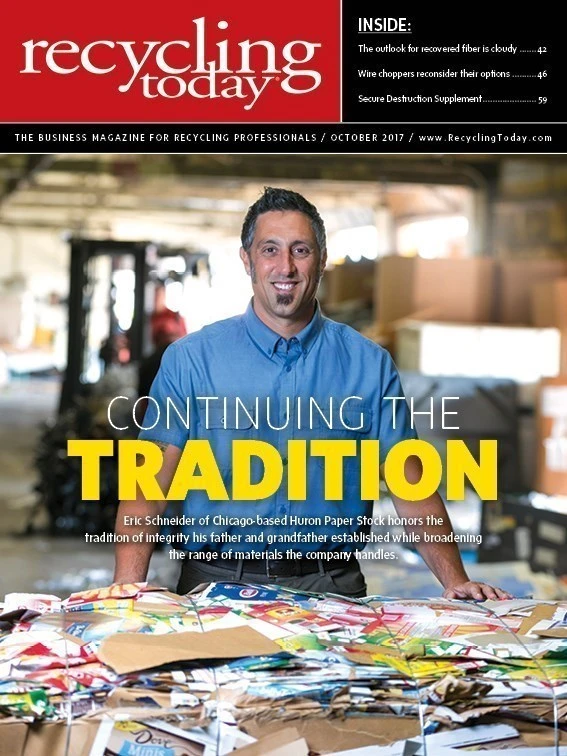QRS of Maryland to idle sorting plant
Effective mid-August of 2017, the QRS of Maryland plant in the Baltimore area, which opened in November 2015, will be idled to enable an optimization of the equipment, according to a news release from the company.
The company says it is evaluating several proposals that may lead to a joint venture or acquisition of the facility. These proposals include well-tested European technology and novel technologies.

QRS of Maryland LLC is a joint venture between St. Louis-based QRS and Canusa Hershman Recycling Co., with corporate offices in Baltimore and in Branford, Connecticut. The recycling facility in Dundalk, Maryland, separates and recycles
The QRS plant combines technology to separate plastics by resin type and recycle them into raw materials for new products and packaging. The facility incorporates the latest optical scanning and cleaning equipment and can process 4,500 tons of materials per month—nearly double the capacity of what’s presently available domestically, QRS of Maryland said when the facility was opened.
The QRS of Maryland facility was funded in part by the Closed Loop Fund, an investment fund that makes below-market loans for recycling infrastructure. The Dundalk plant was the Closed Loop Fund’s first investment in a full recycling facility.Plastic bottle recycling campaign boosts recycling rate in North Carolina
Your Bottle Means Jobs (YBMJ) is a campaign message recently used by the Carolinas Plastics Recycling Council (CPRC) in the Raleigh Durham Triangle region to stimulate more recycling by connecting that activity with job creation. The goal of the campaign is to get more bottles in recycling bins across North and South Carolina.
The campaign measured a 2 percent increase in tons of all types of plastic bottles sold by local recycling processors during March through May 2017 when compared with the same period in 2016, causing campaign leaders Chantal Fryer, director of recycling market development at the South Carolina Department of Commerce, and Blair Pollock with Orange County, North Carolina, to announce the outreach campaign had considerable regional impact.
The YBMJ campaign was financed by a unique partnership of industry, recycling-oriented trade associations and local governments, including Raleigh, Wake and Orange counties in North Carolina. Using billboards, radio, online ads, social marketing pledges and events, the campaign’s call to action for the region is that if each household in the Carolinas increased its plastic bottle recycling by just two bottles a week, that simple act could create 300 new jobs in the two-state region known for its large-scale plastics recycling industry.
The campaign estimates that in one year, two more bottles a week recycled per household would yield 30,000 tons of additional bottles, avoiding more than $1.3 million in landfill disposal costs and creating local jobs in the process.

Pollock says, “While North Carolinians throw out more than 70 percent of the plastic bottles we use, our local industries import recycled bottles from other states as well as abroad to meet their manufacturing demands. This campaign points us in a new direction,
To roll out the campaign, the CPRC conducted a training session on the campaign and offered local leaders a toolkit to incentivize participation. Prizes such as a $500 gift card, a beach vacation and two recycled content gift baskets were offered to those who pledged to recycle. In addition to the more than 800 recycling pledges received to recycle two more bottles at home, on-the-go and at work, there were 1 million online YBMJ ad views and 4 million billboard views.
Fryer says, “We are pleased to see a 2 percent increase in the plastic bottles recycled over the previous year—from 1,323 tons in 2016 to 1,349 tons in 2017. This is the equivalent of over 520,000 PET (polyethylene terephthalate) and HDPE (high-density polyethylene) bottles that can be recycled into new products like T-shirts, textiles, plastic pipe and other goods produced in the Carolinas.”
Alan Goldman of Southeast Grinding, which grinds plastic bottles for recycling, says, “Our company was proud to be a part of this innovative campaign to increase plastic bottle recovery and looks forward to celebrating future successes as the Your Bottle Means Jobs campaign expands throughout the Carolinas.”
Patrick MacDonald,

Explore the October 2017 Issue
Check out more from this issue and find your next story to read.
Latest from Recycling Today
- Orion ramping up Rocky Mountain Steel rail line
- Proposed bill would provide ‘regulatory clarity’ for chemical recycling
- Alberta Ag-Plastic pilot program continues, expands with renewed funding
- ReMA urges open intra-North American scrap trade
- Axium awarded by regional organization
- Update: China to introduce steel export quotas
- Thyssenkrupp idles capacity in Europe
- Phoenix Technologies closes Ohio rPET facility





